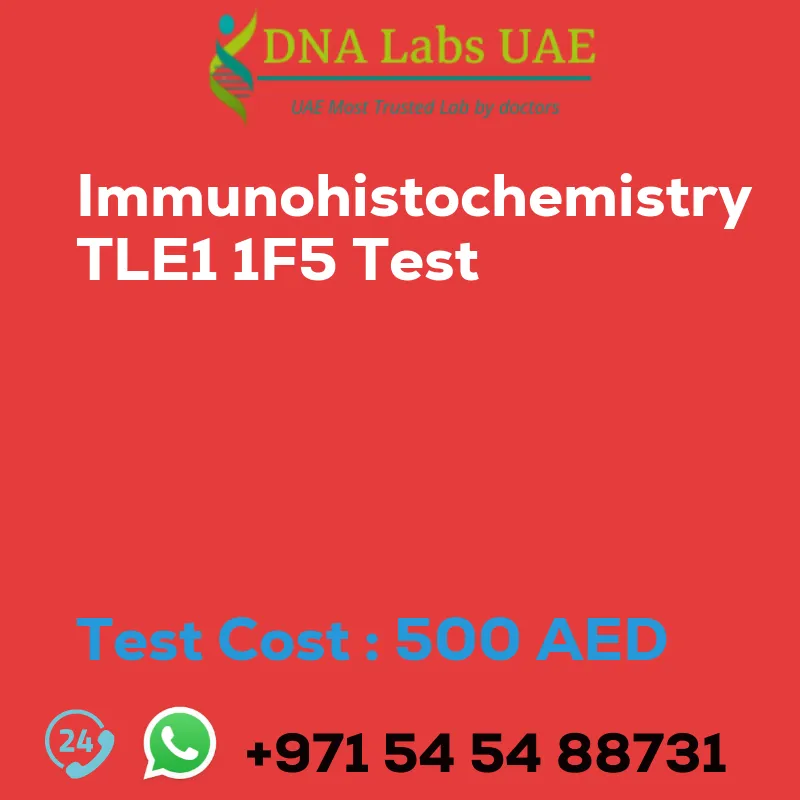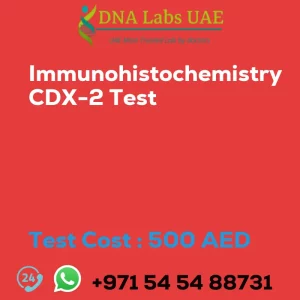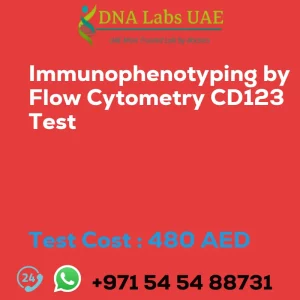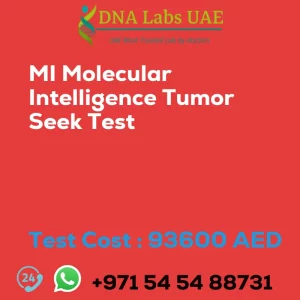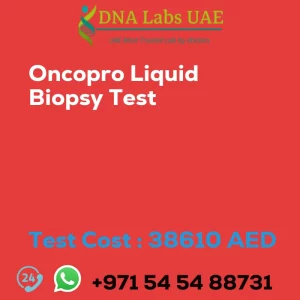IMMUNOHISTOCHEMISTRY TLE1 1F5 Test
Test Cost: AED 500.0
At DNA Labs UAE, we offer the IMMUNOHISTOCHEMISTRY TLE1 1F5 test at a cost of AED 500.0. This test is used to detect the expression of the TLE1 protein in tissue samples.
Test Components
- Price: 500.0 AED
Sample Condition
Please submit tumor tissue in 10% Formal-saline or Formalin fixed paraffin embedded block. The sample should be shipped at room temperature. Additionally, provide a copy of the Histopathology report, site of biopsy, and clinical history.
Report Delivery
Sample: Daily by 6 pm
Report Block: 5 days
Tissue Biopsy: 5 days
Tissue large complex: 7 days
Method
The IMMUNOHISTOCHEMISTRY TLE1 1F5 test utilizes immunohistochemical staining to detect the expression of the TLE1 protein. This test is commonly used in the diagnosis and classification of certain types of tumors.
Test Type
Cancer
Doctor
Oncologist, Pathologist
Test Department
HISTOLOGY
Pre Test Information
Please provide a copy of the Histopathology report, site of biopsy, and clinical history.
Test Details
The IMMUNOHISTOCHEMISTRY TLE1 (1F5) test is used to detect the expression of the TLE1 protein in tissue samples. TLE1 is a transcriptional corepressor protein involved in various cellular processes, including development and differentiation.
The 1F5 antibody is specifically designed to bind to the TLE1 protein and can be used to identify its presence in tissue sections. This test is commonly used in the diagnosis and classification of certain types of tumors, particularly in the field of pathology and oncology.
The immunohistochemistry technique involves staining tissue sections with the 1F5 antibody, followed by the addition of a secondary antibody that binds to the primary antibody. This secondary antibody is usually labeled with a detectable marker, such as a fluorescent dye or an enzyme. The presence of the TLE1 protein is then visualized under a microscope by detecting the signal from the marker.
The IMMUNOHISTOCHEMISTRY TLE1 (1F5) test can be used to identify TLE1 expression in various types of tumors, including synovial sarcoma, which is known to have high levels of TLE1 expression. The test can help differentiate synovial sarcoma from other types of tumors that may have similar histological features but lack TLE1 expression.
Overall, the IMMUNOHISTOCHEMISTRY TLE1 (1F5) test is a valuable tool in the field of pathology and oncology for the detection and classification of tumors based on TLE1 protein expression.
| Test Name | IMMUNOHISTOCHEMISTRY TLE1 1F5 Test |
|---|---|
| Components | |
| Price | 500.0 AED |
| Sample Condition | Submit tumor tissue in 10% Formal-saline OR Formalin fixed paraffin embedded block. Ship at room temperature. Provide a copy of the Histopathology report, Site of biopsy and Clinical history. |
| Report Delivery | Sample Daily by 6 pm; Report Block: 5 days Tissue Biopsy: 5 days Tissue large complex : 7 days |
| Method | Imunohistochemistry |
| Test type | Cancer |
| Doctor | Oncologist, Pathologist |
| Test Department: | HISTOLOGY |
| Pre Test Information | Provide a copy of the Histopathology report, Site of biopsy and Clinical history. |
| Test Details |
The IMMUNOHISTOCHEMISTRY TLE1 (1F5) test is a type of immunohistochemical staining used to detect the expression of the TLE1 protein in tissue samples. TLE1 stands for transducin-like enhancer of split 1 and is a transcriptional corepressor protein involved in various cellular processes, including development and differentiation. The 1F5 antibody is specifically designed to bind to the TLE1 protein and can be used to identify its presence in tissue sections. This test is commonly used in the diagnosis and classification of certain types of tumors, particularly in the field of pathology and oncology. The immunohistochemistry technique involves staining tissue sections with the 1F5 antibody, followed by the addition of a secondary antibody that binds to the primary antibody. This secondary antibody is usually labeled with a detectable marker, such as a fluorescent dye or an enzyme. The presence of the TLE1 protein is then visualized under a microscope by detecting the signal from the marker. The IMMUNOHISTOCHEMISTRY TLE1 (1F5) test can be used to identify TLE1 expression in various types of tumors, including synovial sarcoma, which is known to have high levels of TLE1 expression. The test can help differentiate synovial sarcoma from other types of tumors that may have similar histological features but lack TLE1 expression. Overall, the IMMUNOHISTOCHEMISTRY TLE1 (1F5) test is a valuable tool in the field of pathology and oncology for the detection and classification of tumors based on TLE1 protein expression. |

